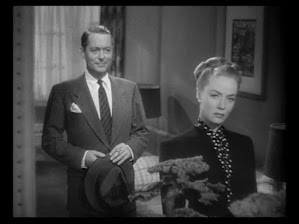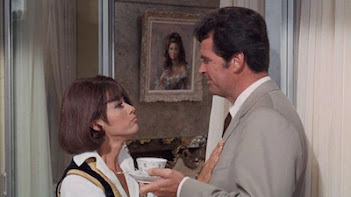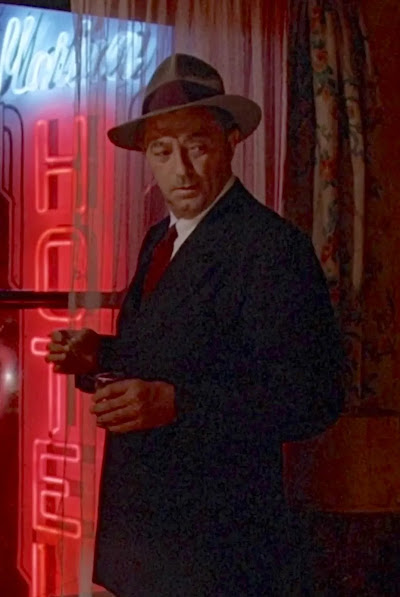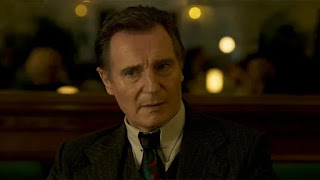Last time around I referenced the long, long history of the film industry's attempts to profitably bring Raymond Chandler's iconic gumshoe Philip Marlowe to the big (and the small) screen. I promised to watch the new film Marlowe, (not to be confused with the 1969 James Garner film of the same title), starring Liam Neeson and share my thoughts about it, and also comparing and contrasting it with all of the film Marlowes who came before.
So let's get started!
First: my thoughts on Neeson's turn as Marlowe:
I loved it.
Neeson is seventy, but he keeps himself in pretty good shape (as demonstrated by his participation in some really well-done fight scenes in the this film), and although clearly an aging Marlowe, and not the age the Marlowe of Raymond Chandler's seven novels and countless short stories would have been in the year of the film's setting (1939), he and the film do not attempt to mask the fact that he's not mid-thirties, as the literary Marlowe would have been in 1939.
Also, director and co-writer Neil Jordan (The Crying Game) further changes things up by making Marlowe Irish-born and raised, at one point referencing the horrors of war he himself had experienced at the horrifying Battle of the Somme in 1916, as a member of the King's Irish Rifles. So this Marlowe is not, specifically Chandler's Marlowe.
 |
| Banville & the Black-Eyed Blonde |
And that stands to reason, as the source material is not a Chandler novel, but one commissioned by the Chandler estate as a "sequel to Chandler's The Big Sleep," and written by Irish novelist John Banville using his crime fiction pen name Benjamin Black: The Black-Eyed Blonde (2014).
The film is gorgeously shot, with Spain taking the place of 1939 Southern California. The action is set specifically in and around mythical "Bay City," Chandler's fictional avatar for Santa Monica. Cinematographer Xavi Giménez may well be in line for an Oscar nomination. The costumes are period perfect, the acting, by an A-list of mostly Irish actors and headed by Diane Kruger, Jessica Lange, Danny Huston, and the always entertaining (and Scottish) Alan Cumming, is first-rate. The pacing is spot-on, the film never dragged or got bogged down in explanations of plot points, nor did it blast through pages of the script at the rate of a Transformers movie.
But most of all, with Jordan's sure hand on the tiller and Neeson all-in and game to try to pull the whole thing off, it just… works.
At least it did for me. I highly recommend this film based on a non-Chandler book. Very entertaining!
So was Neeson's Marlowe the "definitive Marlowe"? Of course not. It's a Marlowe for our times, even if it is set in the early 20th century. Any "definitive" Marlowe would need to carry the feel of Chandler's character in the way that Humphrey Bogart's Sam Spade was definitive (even if the short, dark Bogart looked nothing like the hulking, slope-shouldered "Blond Satan" of Dashiell Hammett's The Maltese Falcon).
With that out of the way, let's take a look at the Marlowes come before…
Other Film Marlowes:
 |
| Sanders (Center) looking bored. |
1. George Sanders (The Falcon Takes Over-1942)" Nope. Not Marlowe, not even an attempt at Marlowe: British actor George Sanders (who was great in many other things, but mostly seems bored here) plays Gay Lawrence, "the Falcon" in the B-movie series of the same name. Not noir, not hardboiled, broad comic subplot played for laughs and with the central character a "gentleman amateur not-quite-detective." Although John Wayne caddy and future Wagon Train star Ward Bond does a pretty fair job of playing "Moose Malloy" in this B-movie take on Farewell, My Lovely (the first, and weakest of three such film adaptations to be featured in this post). With Bond just a year removed from his solid turn as Detective Tom Polhaus in John Huston's seminal The Maltese Falcon, he's clearly better than the material he's given to work with here.
 |
| Not Marlowe-says so right on the door. |
2. Lloyd Nolan (Time to Kill-1943) Nope. He's Lloyd Nolan playing Mike Shayne. This one, the first, and better of two film adaptations of Chandler's The Brasher Doubloon (published in the U.K. and in later American versions as The High Window) to be featured in this post, is also a B-movie filmed quick and cheap. Nolan, a talented character actor whose Hollywood career spanned most of the 20th century, is delightful as Mike Shayne, and the film sports a solid supporting cast, plenty of humor too, and it is superior in pretty much every way to 1947's The Brasher Doubloon- more on that, below! More on Nolan below as well. And you can watch the whole thing on YouTube here.
3. Dick Powell (Marlowe in Murder My Sweet-1944) in the film that helped him rebrand himself as a noir film hero and ditch his previous career as a(n aging) song-and-dance man. Powell is great, but too perky to be Marlowe. The film itself, directed by Edward Dmytryk, is a solid adaptation of the Chandler novel Farewell, My Lovely. This adaptation is more faithful to the subject matter than the Sanders version above (slapped on Hollywood ending notwithstanding). It's also better directed, with a stronger supporting cast (the difference between a "B" picture budget and an "A" picture budget) which included the ever-formidable Claire Trevor, and journeyman Mike Mazurky as probably the best ever film incarnation of the hulking, slow-witted brute, Moose Malloy.
 |
| Powell, as Marlowe, with Mazurky (right), about to be taken for a ride, Chauffeur and all. |
 |
| Bogart is Marlowe in The Big Sleep (1946) |
4. Humphrey Bogart (Marlowe in The Big Sleep -1946) he's great. One of his best performances. The movie is an interesting mess, plotwise (complete with another Hollywood ending-and not even the likes of of A-list script doctors such as Leigh Brackett and William Faulkner can do much with it). The problem for me is that, as hard as he tries, Bogart still comes across like Sam Spade-his other iconic detective role, and from a much better movie. Great supporting cast: Lauren Bacall (with a teenaged Andy Williams supposedly dubbing her singing voice), Regis Twomey as long-time Marlowe associate Bernie Ohls, the Los Angeles District Attorney's chief investigator, and Marlowe's former boss, the great Elisha Cook, Jr. (riveting as Wilmer Cook, the psychopathic "gunsel" in The Maltese Falcon), and a not-yet-discovered Dorothy Malone sizzling in a single scene with Bogart as the clerk in a bookstore where Marlowe waits out a rainstorm.
 |
| Robert Montgomery and Audrey Totter, in the mirror. |
5. Robert Montgomery (Two on-screen scenes in the camera-as-eyes-of-the-narrating-detective in The Lady of the Lake-1947). Dubbed a "startling and daring new method of storytelling–a milestone in moviemaking." In truth, an ambitious flop that condensed the source material in what is arguably one of Chandler's better novels (with, wait for it… yet another tacked on Hollywood ending). Mongomery directed, and starred as Marlowe in voice-over, using the camera as the eyes of the main character. He only appears in two scenes where he sees himself in a mirror. Definitive Marlowe? Nope. Although the aforementioned Lloyd Nolan steals the show here as corrupt cop De Garmo.
 |
| George Montgomery: Swashbuckling Marlowe! |
6. George Montgomery–No Relation– (The Brasher Doubloon / The High Window-1947) B-movie effort and Montgomery, who is game and gives it his all (In spite of the fact that Montgomery's "all" seems to include playing Marlowe as if he were a method actor trying to play the hard-boiled icon as Errol Flynn.), is at the mercy of his own limitations and a script that makes his Marlowe far more interested in "love" than in "saving" the victim as was the case in the source material (Complete with, you guessed it: still another tacked on Hollywood ending!). Right age, and aside from the pencil thin mustache, right "look," but no dice. And you can also watch this one on YouTube here.
 |
| The wonderful Rita Moreno & Rockf-ermm Marlowe. |
7. James Garner (the title character in Marlowe-1969) plays a P.I. who comes across as more proto-Rockford than as Philip Marlowe in this relatively faithful (no Hollywood ending!) adaptation of the excellent and often overlooked Chandler novel The Little Sister. Updated "modern" setting. Great supporting cast, especially Rita Moreno, Gayle Hunnicutt, Sharon Farrell, and H.M. Wynant as mobster Sonny Steelgrave. Bruce Lee is in it, and he's reliably terrible. Then again, the chops they cast him for weren't his acting chops. (*rimshot*).
 |
| "That's okay with me." When "okay" is frequently NOT "okay"... |
8. Elliott Gould (Marlowe in Robert Altman's The Long Goodbye 1973) as a shambling, tatterdemalion, sort-of hippy Marlowe? NOPE. Hardly "definitive."
The first time I watched this film I loathed it. A few decades and a number of re-watchings later, and this film has much to recommend it. It is surprisingly faithful to the Chandler novel of the same name. Okay, maybe not so surprising, in light of the fact that Leigh Brackett penned the screenplay. Altman's The Long Goodbye bears the dubious distinction of containing a torture scene that still manages to shock the viewer, a half-century after its release.
The cast (including Gould, who is following Altman's direction to a t) is superb. Sterling Hayden was never better (and that's saying something) than in his role of millionaire author and part-time nutjob Roger Wade. Mark Rydell, known primarily for his work as a director (he would go on to garner an Oscar nomination for On Golden Pond.) is unforgettable in his brief turn as vicious thug Marty Augustine (who does not appear in the novel). Henry Gibson (of Rowan & Martin's Laugh-In fame) is inspired casting as the drug-peddling quack Dr. Verringer. Baseball player (and author of the unforgettable sports memoir Ball Four) Jim Bouton was not an actor and it showed in his mostly wooden performance as Marlowe's doomed pal Terry Lennox, but they can't all be winners. And lastly, this film actually improves on the ending Chandler penned for the book. it's easily my favorite ending of any Marlowe film ever, and one of my favorite film endings, period, regardless of genre.
 |
| Not in any way a spoiler, honest. |
 |
| Mitchum–absolutely GREAT as Marlowe. |
9. Robert Mitchum Marlowe in Farewell My Lovely 1975) The third, and best of the three film adaptations of the Chandler novel of the same name. Mitchum was 58 when he took this on, and does nothing to try to play the part as "younger" (Marlowe in the 1942 novel would have been in his mid-thirties), and his performance is the better for it. this one ranks right up there with the best: Bogart, especially. And yet, I can't help but wonder what might have been, had Mitchum taken on this role in 1948, instead of the overrated (in my opinion) Out of the Past? Such a portrayal may well have been the definitive Marlowe. There was an air of sardonic nihilism that younger Mitchum pretty near perfectly embodied: too cool to care what others thought of him and knowing that his target audience were "guys with dirty fingernails and dirty shirts who have lost at least one job for talking back to someone..." And while late-fifties Mitchum is a terrific actor who gives a dynamite performance, he can't help but be more measured, more caring about the effects of his actions. His very age and him acting it, inhibits that performance, albeit slightly. It's a small quibble, but that's the difference between "great" and "definitive." As for the film itself, John Ireland is terrific as police detective Nulty, Harry Dean Stanton chews the scenery (which is appropriate in this instance) as Nulty's corrupt cop partner (and Marlowe foil) Billy Rolfe. Sylvia Miles scored an Oscar nomination for her turn as Jessie Florian, Charlotte Rampling is deathly dull as Helen Grayle (especially when compared to Claire Trevor), Jack O'Halloran is appropriately massive as Moose Malloy. And a year before Rocky, a young Sylvester Stallone has a "blink and you might miss it" role as whorehouse enforcer "Jonnie."
10. Robert Mitchum (Marlowe in The Big Sleep-1978) The less said about this blatant cash grab, the better. So I'll leave it at this: only three years separate this film from the vastly superior Farewell, My Lovely, and yet in this one Mitchum comes across as past-his-prime. Plus it's a modern update of the source material from 1939 to 1978. And the action is inexplicably moved from Los Angeles to London. ENGLAND. None of this is Mitchum's fault, but there you go.
 |
| NOPE. Don't bother. |
 |
| Nah. |
 |
| Well-done, Liam! |
However, Chandler wrote Marlowe envisioning a scruffy Cary Grant playing the role. 40s Mitchum is pitch-perfect. So, short story long: I think there is no definitive Marlowe on film. Nor is there ever likely to be.
And what's wrong with that?
 |
| The definitive Marlowe? |
And on that note, time for me to wrap it up and pack it all in for now. Tune in next time when I conclude this Marlowe media deep dive by touching on Marlowe portayals in TV and radio.
See you in two weeks!

Regarding George Sanders, let's never forget that, in 1972, he left this suicide note: "Dear World, I am leaving because I am bored. I feel I have lived long enough. I am leaving you with your worries in this sweet cesspool. Good luck." He always struck me as being bored in EVERY role, even in "All About Eve" and "A Shot In the Dark" (one of my favorite Clouseau movies).
ReplyDeleteI agree, we don't need a "definitive" Marlowe, although I agree, I think Mitchum could have been that if they'd cast him in the 40s.
Eve- Sanders’s story there at the end is kinda heartbreaking. His note and it’s ennui-laced tone notwithstanding, the sixties were pretty tragic for him. His brother Tom Conway (who followed George to acting, and even succeeded him as “The Falcon” when Sanders decided to move on from the role) had a serious alcohol problem that rendered him homeless and dying in the mid-sixties (this after Sanders had cut off all contact over Conway’s drinking). He died in of liver failure in Venice Beach, in 1967, the same year that Sanders’ beloved third wife Benita Hume (who was also Ronald Coleman’s widow) died of cancer. Sanders remarried (a Gabor sister), but he never really got over her death. He divorced his final wife in 1971, after he had been diagnosed with early stage dementia. As his memory began to seriously fail him, Sanders made the choice to end it all, book a vacation to sunny Spain, and took a bunch of barbiturates in his hotel room, April, 1972.
DeleteWhat a great, in-depth analysis! I think I've seen all these versions, and I agree completely with your thoughts.
ReplyDeleteYou've also given me some good ideas for rewatching--I'm headed over to Netflix right now.
Thanks John! Just out of curiosity, what did you find at Netflix? I didn’t find anything Marlowe-related there.
DeleteBrian, I have not only Netflix's streaming service but also their DVD mail service, where I can usually located any movies not currently streaming on Netflix or Prime. But when I looked I could only find Murder My Sweet, Gould's The Long Goodbye (which I re-watched only recently), and both versions of The Big Sleep. Neither the James Garner Marlowe nor Farewell My Lovely were available, and of course the Neeson Marlowe isn't on Netflix yet.
DeleteJohn- I obviously need to take a good look in the DVD side of my own Netflix membership! And by the way, both FAREWELL MY LOVELY and the Garner version of MARLOWE are available on Amazon Prime’s streaming service, FYI. Thanks for getting back to me on this!
DeleteI completely overlooked those two, on Prime! You've given me something to watch tonight.
DeleteLet me know what you think!
DeleteThere was also the HBO series with Powers Booth as Marlowe based on a series of Chandler shorts. Given Booth's sometimes intense performances (like his damned bipolar character in Deadwood), I'm not sure how I feel about him playing a man who himself is not mean. Bogart, Mitchum, Garner, and Neesom pull off Marlowe because they get the personality, which threw me with Altman's muttering version. Though Gould was great as THAT Marlowe.
ReplyDeleteWatch this space- next time around I’m touching on Powers Boothe in that `80’s HBO series, Danny Glover in the Showtime anthology adaptation of “Red Wind,” the Philip Carey 1959 series, the unaired Jason O’Mara ABC pilot from 2007, and all of the radio Marlowes, too!
DeleteI could buy Neeson, although I always picture Marlowe in black and white. That may be why I couldn't abide Gould and barely tolerated Garner in the rôle. Come to think of it, I wasn't fond of George Montgomery who seemed clownish to me.
ReplyDelete